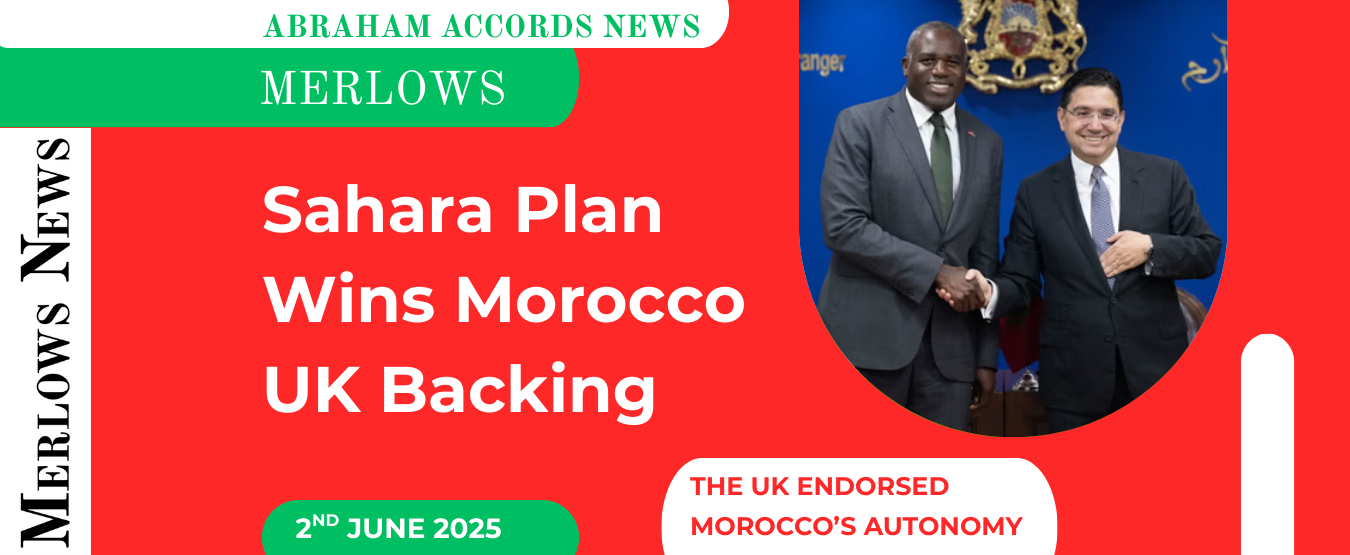Britain formally endorses Morocco’s autonomy plan for Western Sahara. The media calls it “controversial.” In truth, it’s another ripple effect of the Abraham Accords reshaping the region.
The West finally sides with Morocco’s sovereignty in Western Sahara. It strengthens the Abraham Accords’ momentum. The media shrugs, elites hedge, but history is moving.
The Background
The UK government officially endorsed Morocco’s autonomy plan for Western Sahara on 2 June 2025, aligning with Washington, Paris, and Madrid. The move strengthens Morocco’s hand internationally and indirectly reinforces the Abraham Accords, since Rabat joined in 2020 in exchange for U.S. recognition of its claim. (Wikipedia – Western Sahara Autonomy Proposal)
Western media framed the decision as “controversial,” but the truth is clear: Britain has chosen sovereignty and stability over endless ambiguity. For Morocco, it cements legitimacy. For Israel, it validates another Accords partner. For the region, it’s proof that trade and recognition matter more than slogans.
And yet, the BBC offered a shrug, the Guardian muttered about “colonial echoes,” and Sky called it “symbolic.” They downplay it because it doesn’t fit their narrative: peace through strength, sovereignty through clarity.
BBC:
“The UK’s support is controversial and may inflame tensions.” Controversial? Recognition is clarity. Endless ambiguity was the real provocation.
Source: BBC News, 2 June 2025
Western Sahara Plan Endorsed
On 2 June 2025, the UK took a decisive step: it formally endorsed Morocco’s autonomy plan for Western Sahara. (Wikipedia)
For decades, the dispute has lingered—UN resolutions, endless “peace talks,” and diplomatic paralysis. But the Abraham Accords broke the deadlock in 2020. The U.S. recognised Morocco’s claim as part of the deal that brought Rabat into peace with Israel. Today, Britain joins that consensus.
This is more than a symbolic nod. It is a recognition of reality. Morocco controls the territory, invests in it, and develops it. Stability requires clarity. And now, the UK is siding with sovereignty.
Yet, how did the media frame it? The BBC dismissed it as “controversial.” The Guardian ran an op-ed warning of “colonial echoes.” Sky News called it “mostly symbolic.” None acknowledged the strategic truth: the Abraham Accords created a framework where sovereignty and trade flow together.
The Guardian:
“Colonial echoes haunt Britain’s decision on Western Sahara.” Colonial echoes? It’s sovereignty, not empire.
Source: The Guardian, 2 June 2025
For Morocco, the benefits are clear. Recognition strengthens its economy, secures investment, and opens doors to European partners. For Israel, Morocco’s stability secures an ally across the Mediterranean and validates the Accords. For Britain, aligning with reality gives leverage in trade and security.
But elites hate this narrative. Because it proves once again that peace through strength—clear sovereignty, unapologetic trade—is effective. They prefer ambiguity, endless “talks,” and managed decline. They call progress “controversial” because it threatens their monopoly on truth.
Western Sahara is not just a desert. It is a test case. Do we acknowledge reality, or bury it under UN jargon? Do we reward courage, or appease chaos? The Abraham Accords say: acknowledge, reward, build.
This is the ripple effect of Israel’s peace deals. One agreement in 2020 cascades, four years later, into Britain reshaping its foreign policy. That is momentum. That is proof. And that is exactly why the elites downplay it.
The Merlow View
Two outcomes are possible. First—the unlikely one—is that elites admit the truth: that the Abraham Accords reshaped geopolitics, that Morocco’s sovereignty is now fact, and that clarity brings stability. If so, Britain’s move could herald wider recognition, and peace through trade will expand.
Second—the rational path—is that citizens seize the narrative. Ordinary people must reject the media’s spin, share the truth, and demand leaders side with sovereignty. If that happens, the Accords will keep rippling outward, proving strength and clarity build peace.
But if we leave the story to elites, they will bury it in euphemisms. They will sneer about “colonial echoes” while the region moves forward. Sovereignty is not colonialism. Stability is not controversy. The Abraham Accords are not fragile—they are history unfolding. Britain has chosen reality. The question is: will its citizens defend it?
“Citizens must demand recognition of reality. Sovereignty builds peace support it, share it, defend it.”







Share this: